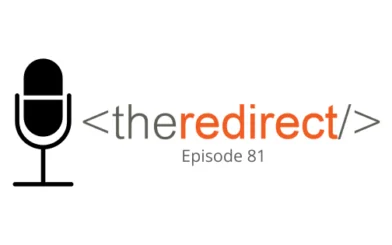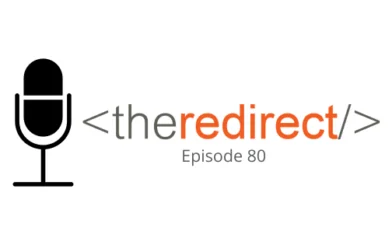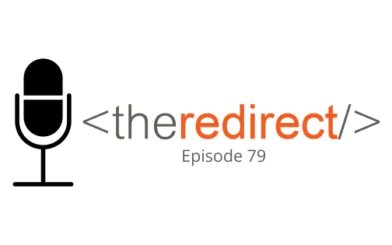Episode 51 / July 20, 2018
Listen now:
Welcome to The Redirect Podcast, where the BlackTruck team shares recent insights and takeaways from the world of search marketing.
In this week’s episode, we’re celebrating a year of The Redirect Podcast. By our quick math, that’s something between 25 and 30 hours of content we have recorded. So here’s a hat tip to our listeners, to the BlackTruck team, and to our guests for making this happen. We really just set out to start conversations and share some insights with you, and the feedback we have received is great. Thank you!
We spent pretty much all last week out at MozCon in beautiful Seattle, hanging out with other search marketing peers. MozCon can be summed up as three days of drinking from the firehose, networking, and a lot of bacon. (Seriously, the breakfasts are delicious.)
On this episode, we’re going to give you some highlights from MozCon 2018 and some key takeaways.
View the MozCon 2018 schedule and presentation slide decks (link opens in a new window).
Big Themes from MozCon 2018
- Finally more focused efforts on the user, user experience, and site performance.
- Thinking less about individualized keywords and more on themes, AKA “Entities.”
- Structured Data, Structured Data…Structured Data.
Standout Presentations
Jono Alderson – The Democratization of SEO
Jono basically forced us all to look at what’s next, and BEYOND the usual blocking and tackling in SEO, which is what many professionals in the industry spend most of their time addressing. And who’s fault is that? There’s a lack of education and perhaps even a stubbornness among SEOs to “make sure we’re involved” in this or that, when what may be best for situation is explaining concepts and highlighting the “whys” instead of seeking control. When basic SEO problems can be cleared up through education and onboarding of others involved with the website, the SEO can move on to address more complex site needs.
Taylor Coil – Why “Blog” is a Misnomer for Our 2018 Content Strategy
Taylor opened her presentation with a bold claim: “No one really cares about our blogs.”
She’s not wrong. “The key problem,” Taylor said, “is that marketers tend to conflate ‘content marketing’ with ‘blogging.’ They’re not the same thing. We’re doing a disservice with this conflation.” Traditionally, blogs can be much more brand-focused than customer-focused, and so the posts don’t lend themselves to bringing in traffic for long after the creator hits “publish” and does a push on social media. Taylor recommended approaching your website’s content marketing efforts by thinking in terms of creating resources, not blog posts.
In other words, think: “How can I be helpful?” (We’re proud to say this is how we already approach content development for our clients, though we know there is always room to improve in this industry.)
Beyond changing the approach to the content itself, one way to be more helpful is to make structural changes to the website—whether its revamping your entire blog/resources landing page, or to simply rethink the order of how your content is displayed. As an example, instead of showing pieces in reverse chronological order, which is typically the default, why not show what have proven to be your most helpful pieces first? Does the “freshness” of a publication date REALLY matter for the visitor? Very likely not, as long as they’re getting accurate information.
If you need proof of why customer-centric content matters, Taylor had some visuals for that:
From @taylorcoil: What happens with brand-focused content vs. what happens with customer-centric content #MozCon pic.twitter.com/yELo1uOdmK
— Ashley Bovin (@aruthbovin) July 9, 2018
Dana DiTomaso – Focused Reporting: Fewer Reports that Do More
“Monitoring is data. Reporting is insight.” Dana explained that digital marketers need to be better about asking clients to communicate real goals so we can better report on how our work contributes to their overall success. And more than just numbers, reporting should include insights on what those numbers do or don’t mean.
A small, but significant takeaway from Dana’s presentation was the example she showed of a Data Studio dashboard with very clear microcopy, making the information accessible and understandable for clients. The example used questions related to goals as the headings in the reports. Consider, for instance, the difference between these headings:
- Phone Calls vs. “Is your phone ringing?”
- Channels vs. “How do visitors get to your website?”
Instead of using analytics lingo, make the data approachable; create “human-centered dashboards.”
Rob Bucci: Near me or Far: How Google May Be Deciding Your Local Intent for You
The first of many presentations on local SEO, Rob used the wealth of data available to him at STAT to analyze local search queries and local search results pages.
How local queries are structured can impact the search results. For example, from the description of Rob’s presentation: “The query [best breakfast places] suggests that quality takes top priority; [breakfast places near me] indicates that close proximity is essential; and [breakfast places in Seattle] seems to cast a city-wide net; while [breakfast places] is largely ambiguous.
Rob explained that “every SERP is local,” as “Google (almost) always knows where you are.” A searcher’s location at the time a search is performed influences how results are served up. Do the same search from a location a few blocks away, and you’ll have slightly different local pack results (that box with a map Google shows at the top of some searches).
The study also found that the searcher’s proximity has a bigger influence on local pack results than geo-modifiers (“in grand rapids”) do. (Geo-modifiers DO impact organic results a lot. Local packs, not as much.)
Rob explained that it’s up to us to understand Google’s decision and to create strategy accordingly. He also strongly recommending tracking local vs. hyper-local rankings, instead of local vs. national.
Other Insights
- Factoid from Sarah Bird’s introduction: 40% desktop searches and 60% mobiles searches do not result in clicks. SEOs must keep up with changes in SERPs to optimize effectively.
- “Technical SEO is like roots. Without a strong foundation, a site is like a tumbleweed.” —Alexis Sanders
- Heather Physioc’s “Red Tape Toolkit” presented a useful model for improving agency/client relationships and getting work implemented by considering clients’ “organizational search maturity.”
- Russ Jones challenged the quality of the data we use, calling SEOs to learn to dig into multiple tools to gather insight, dig deeper, and demand better data from the tools.
- Darren Shaw talked reviews, and made a good suggestion: In your newsletter, highlight a selected review that has been left for your business. It not only conveys a third-party endorsement of your business, but other customers seeing the positive review may be inspired to leave a review of their experience, too.
And that’s nearly not the end of what we learned, either. We left the conference feeling challenged and encouraged by three days’ worth of industry-leading research and insight. It was a great opportunity to connect with other professionals and to be in our geeky element.
Listen to the full episode to catch more round-robin insights from MozCon 2018.
Thanks for tuning in! To catch future episodes of The Redirect Podcast, subscribe on SoundCloud, iTunes, or Stitcher.




